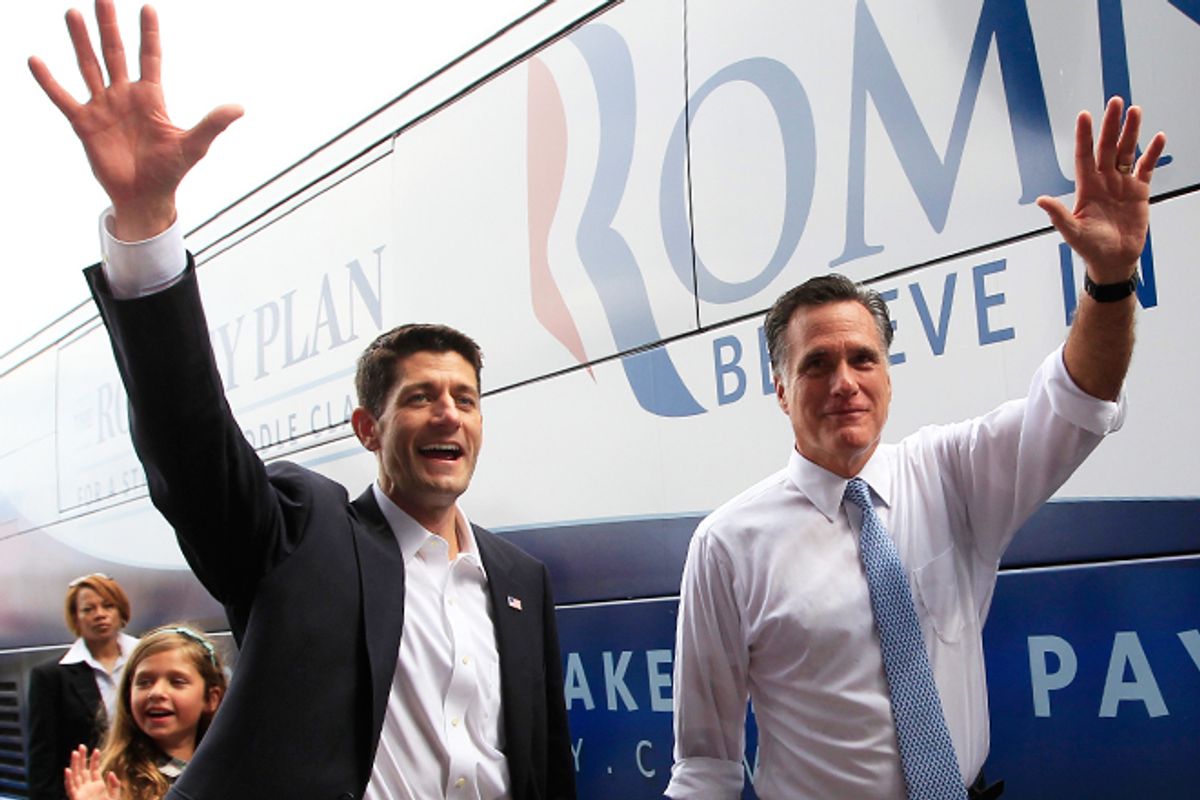Foreign policy has never been a major part of this campaign and likely never will be, considering that voters consistently rate the economy as their top issue. But it doesn’t change the fact that Mitt Romney’s pick of Rep. Paul Ryan as his vice presidential nominee makes his the first major party ticket in at least 50 years without any formal foreign policy or military experience.
Romney was a governor with no meaningful foreign policy experience to speak of -- even Republican senators struggled to defend his qualifications on the issue -- while Ryan, as a congressman, serves on two strictly economic committees, Budget and Ways and Means. Neither Romney nor Ryan has served in the military. Neither President Obama nor Vice President Biden served in the military, either -- this is the first election since 1944 where none of the candidates is a veteran -- but Obama, in his short time in the Senate, had served on the Foreign Relations Committee, and Biden was the chairman of that committee. For example:
- Their opponent in 2008 was Sen. John McCain, a war hero who serves as the ranking member of the Armed Services Committee and is one of his party’s most outspoken voices on international affairs. The expectation of foreign policy was so strong that year that Sarah Palin tried to play up her governorship of a state near Russia as bona fides.
- In 2004, Democratic Sen. John Kerry was also a decorated military vet who held a senior spot on the Foreign Relations Committee (he took over when Biden left to be V.P.).
- In 2000, George W. Bush was a governor with no foreign policy experience, though he served in the National Guard, while vice presidential nominee Dick Cheney served as Secretary of Defense under Bush’s father. Democratic presidential nominee Al Gore served in the military and sat on the Senate Armed Services and Homeland Security Committees, while vice presidential nominee Joe Lieberman sat on Homeland Security (he’s now the committee’s chairman).
- In 1996, GOP nominee Bob Dole was a war hero, and his vice presidential pick, Rep. Jack Kemp, a godfather of supply-side economics and Ryan’s mentor, had served in the Army.
- 1992 was another election dominated by the economy, and Democrats were light on experience, though vice president Gore had served in the military and on the House Intelligence Committee.
- In 1988, Republican nominee George H. W. Bush had served as the director of the Central Intelligence Agency and in the Navy. Even that year’s Democratic nominee, Governor Michael Dukakis -- whose embarrassing photo-op in a tank helped sink his campaign -- had served in the Army. Dukakis' vice presidential pick, Senator Llyod Benson, was a distinguished Air Force vet.
- In 1984, Democratic candidate Walter Mondale had served as vice president under Jimmy Carter, playing a leading role in the president's foreign policy agenda. He served on the Senate Intelligence Committee and an ad hoc intelligence oversight committee, and had served in the Army.
- In 1980, a charismatic Republican governor with no foreign policy experience swept the GOP into the White House. But for his vice president, Ronald Reagan picked his primary challenger George H. W. Bush in part to bolster his foreign policy experience. In addition to serving as director of the CIA, Bush was an ambassador to the UN and envoy to China.
- Jimmy Carter, the Democratic nominee in 1976, was a governor who at least had served as a Navy officer. Republican Gerald Ford, who took over for Richard Nixon in 1974, was a lieutenant commander in the Navy in World War II. His vice president, Nelson Rockefeller, had served as an Assistant Secretary of State and had other foreign policy experience.
- 1972 Democratic nominee Sen. George McGovern was a distinguished Air Force vet. His vice presidential nominee, Sargent Shriver (who replaced Thomas Eagleton), had served in the military, helped found the Peace Corps and served as an ambassador to France.
Of course, foreign policy experience does not equal good foreign policy. Cheney was one of the most experienced candidates on this list, but he helped lead the country into a disastrous war in Iraq. Meanwhile, Franklin Roosevelt had never served in military (though he was Secretary of the Navy), but he proved to be a successful commander in chief during World War II. But it’s still somewhat of a milestone to have two candidates on a major party ticket with zero formal foreign policy or military experience.
Democrats have already made hay of this, questioning the field’s foreign policy chops, and Republicans have already counterattacked. Newt Gingrich, who accuses President Obama of being too naive on international affairs, claimed Ryan’s lack of experience on the topic is actually an “advantage.”

Shares